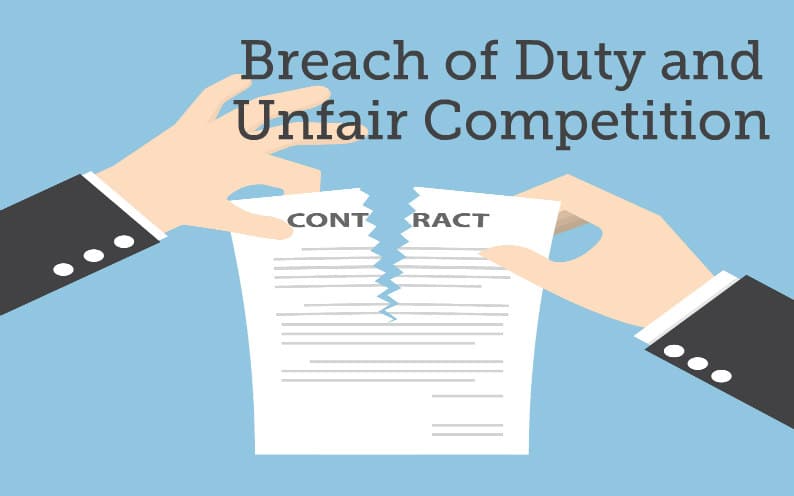Business Attorney in Shreveport, Louisiana
Experienced Breach of Duty and Unfair Competition Lawyer in Shreveport
When a breach of duty and/or unfair competition occurs, enormous damage can be done to businesses and individuals. Thus, there are laws governing such conduct that provide monetary and punitive remedies.
BREACH OF DUTY
What is Breach of Duty?
The simplest definition of breach of duty is a violation or failure to perform a legal or moral duty. In business transactions, it is the failure to properly carry out the duties of an office, employment or fiduciary position. When a person agrees to perform agreed-upon duties for another person or entity in good faith, it is assumed they can be trusted to carry out those responsibilities. Since the breach of a duty primarily occurs when a person is in a fiduciary role, the fiduciary breach of duty is explained below.
What is a Fiduciary Breach of Duty?
While a general breach of duty might occur when a person has agreed to be responsible for an individual’s general well-being, such duties often involve finances. In the latter case, the fiduciary may manage assets and property of individuals, businesses, or groups. Example roles of a fiduciary may include financial advisors, brokers, money managers, bankers, executors, accountants, board members, and corporate officers, and even a family member assigned the task of overseeing the finances of another family member. As well, attorneys have a fiduciary duty to their clients, doctors to their patients, directors of corporations to their shareholders. Also, a trustee of an estate has fiduciary obligations as does a guardian who is responsible for a dependent person.
Simply put, a fiduciary is a person, business, or organization that legally is required to perform agreed-upon duties for another person or entity in good faith.
According to Louisiana law RS 10:3-307, “fiduciary means an agent, trustee, partner, corporate officer or director, or other representative owing a fiduciary duty with respect to an instrument.”
The primary characteristic of fiduciary duty is that one party places “trust and confidence” in a person who must exercise expert knowledge and discretion on their behalf. As a fiduciary agent, they are governed by the highest laws and ethics to act in another’s best interests– breaching those responsibilities is a serious legal offense.
When the above legal and ethical standards are not adhered to by the fiduciary, they have failed to act in the best interest of the other person, under Louisiana Law RS 11:264.5, this is considered a breach of fiduciary duty.
The law states:
“Any person who is a fiduciary with respect to a plan who breaches any of the responsibilities, obligations, or duties imposed upon fiduciaries … shall be personally liable to make good to such plan any losses to the plan resulting from each such breach, and to restore to such plan any profits of such fiduciary which have been made through the use of assets of the plan by the fiduciary, and shall be subject to such other equitable or remedial relief as the court may deem appropriate, including removal of such fiduciary.”
When there is a breach of fiduciary duty, a civil cause of action can be taken against the agent.
UNFAIR COMPETITION
Breach of Duty Involving Unfair Competition Defined
When an employee or company steals trade secrets, engages in trademark infringement, uses confidential and/or proprietary information or misappropriates labor and expenditures of an employer or company for their own profit, this constitutes unfair competition. In most unfair competition litigation, it is necessary to prove the person engaging in such conduct did so in “bad faith” using fraud or deception or abused a fiduciary or confidential role to compete. Another example of unfair competition is when a business uses the confidential information of another business without permission and causes the other business financial losses. Often this occurs when a former employee provides confidential information to a company, such as a customer list, that gives a new employer an unearned advantage. Deceitful practices such as false advertising may also be legally considered unfair competition.
Potential Breach of Duty and Unfair Competition Legal and Monetary Consequences
Violating one’s fiduciary responsibilities or engaging in unfair competition may lead to major financial consequences, and in the case of individuals, could end a career.
Compensatory Damages When a breach of fiduciary duty or unfair competition has caused a person (or persons) to suffer financial losses, the fiduciary may be required to monetarily compensate the victim for those losses. In most cases, the compensation will be equal to the amount of financial damage the fiduciary caused.
Punitive Damages In extreme cases of breach of duty—typically fraud or malice—punitive damages may be awarded in addition to any compensatory damages. Also, such cases may be criminally prosecuted.
Professional Consequences A breach of fiduciary duty could lead to an agent’s loss of professional licensure or accreditation preventing them from continuing in their profession. In some cases, depending upon the person’s professional capacity such as a physician or lawyer, it could lead to a malpractice lawsuit.
The Statute of Limitations—Breach of Duty and Unfair Competition
The deadline for pursuing breach of duty and unfair competition compensation and consequences depends upon many factors. Usually, the time within which a claim can be filed is from the date of the violation discovery. Since it may be challenging to determine when the breach of fiduciary duty or unfair competition occurred, an attorney may be able to help. It’s vitally important that you don’t exceed the deadline before you act, or you may permanently lose your rights for remedies and justice.
For knowledgeable legal assistance with a breach of duty or unfair competition issue, contact The Greenwald Law Firm for a confidential, no-cost assessment of your unique situation. With a conveniently located office in Shreveport, our legal team is immediately available to meet with you. Call 318.219.7867 or send us a confidential message on our contact form.

